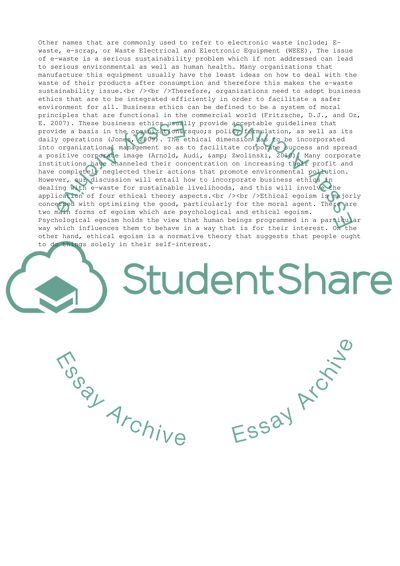Cite this document
(How to Incorporate Business Ethics in Dealing with E-Waste for Coursework Example | Topics and Well Written Essays - 2250 words - 3, n.d.)
How to Incorporate Business Ethics in Dealing with E-Waste for Coursework Example | Topics and Well Written Essays - 2250 words - 3. https://studentshare.org/management/1845447-write-a-reflective-essay-on-a-current-ethics-or-sustainability-problem-based-on-an-extended-example-from-a-business-organisation-of-the-students-choice-extensive-application-of-four-ethical-theories-is-expected
How to Incorporate Business Ethics in Dealing with E-Waste for Coursework Example | Topics and Well Written Essays - 2250 words - 3. https://studentshare.org/management/1845447-write-a-reflective-essay-on-a-current-ethics-or-sustainability-problem-based-on-an-extended-example-from-a-business-organisation-of-the-students-choice-extensive-application-of-four-ethical-theories-is-expected
(How to Incorporate Business Ethics in Dealing With E-Waste for Coursework Example | Topics and Well Written Essays - 2250 Words - 3)
How to Incorporate Business Ethics in Dealing With E-Waste for Coursework Example | Topics and Well Written Essays - 2250 Words - 3. https://studentshare.org/management/1845447-write-a-reflective-essay-on-a-current-ethics-or-sustainability-problem-based-on-an-extended-example-from-a-business-organisation-of-the-students-choice-extensive-application-of-four-ethical-theories-is-expected.
How to Incorporate Business Ethics in Dealing With E-Waste for Coursework Example | Topics and Well Written Essays - 2250 Words - 3. https://studentshare.org/management/1845447-write-a-reflective-essay-on-a-current-ethics-or-sustainability-problem-based-on-an-extended-example-from-a-business-organisation-of-the-students-choice-extensive-application-of-four-ethical-theories-is-expected.
“How to Incorporate Business Ethics in Dealing With E-Waste for Coursework Example | Topics and Well Written Essays - 2250 Words - 3”. https://studentshare.org/management/1845447-write-a-reflective-essay-on-a-current-ethics-or-sustainability-problem-based-on-an-extended-example-from-a-business-organisation-of-the-students-choice-extensive-application-of-four-ethical-theories-is-expected.


